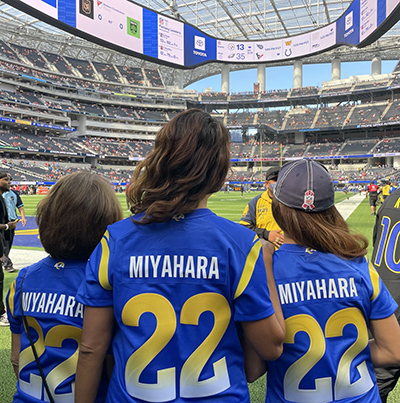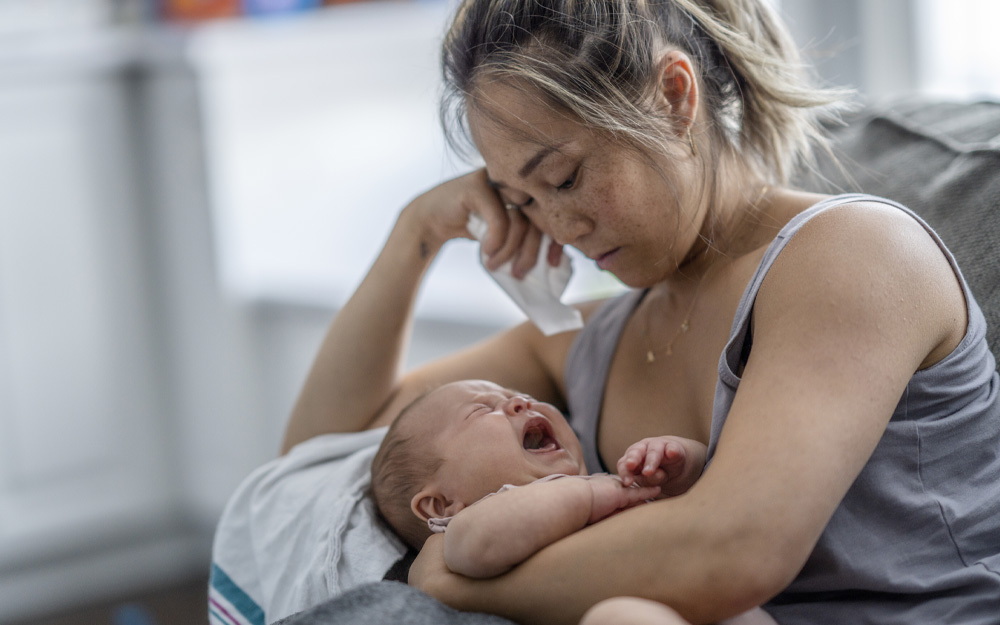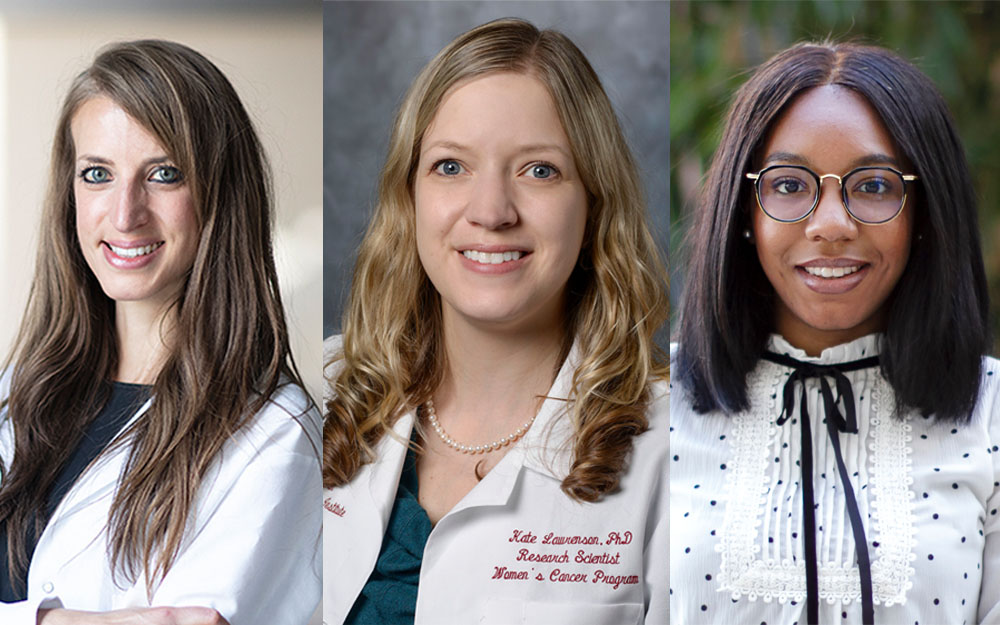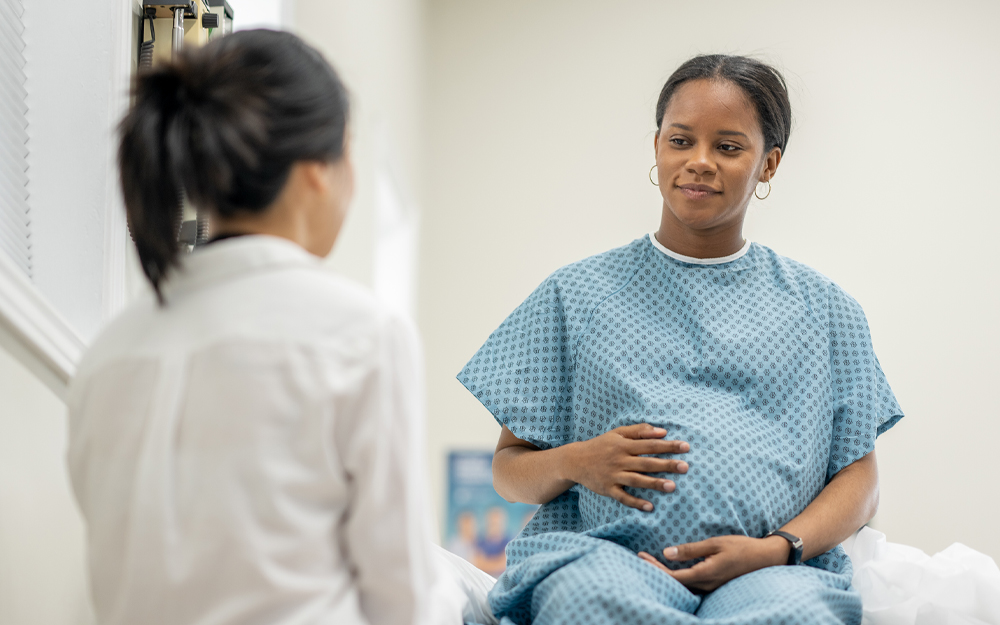Stronger Together: Family Faces BRCA-Positive Breast Cancer
Date
March 23, 2023

Date
March 23, 2023
Credits
Medical providers featured in this article
In Brief
{{cta-block}}
Trina and Kelly Miyahara aren’t just sisters. They’re best friends.
Growing up with their mom, Wanda, and dad, Paul, they spent hours meticulously drawing barcodes on their books so they could play “library.” The girls also borrowed lacy half-slips from Wanda to wear on their heads, sashaying down pretend aisles as brides at make-believe weddings.
"Genetic testing is critical in the era of precision medicine. Patients who test positive for an actionable mutation can benefit from early screening for different cancers, early treatment and possible preventive treatments."
As adults, Trina and Kelly live no more than a mile from each other in Redondo Beach. Misty-eyed and joyful, they adjusted each other’s veils on their real wedding days. They’ve learned to master their die-cutting machines for countless projects while swapping parenting advice as they raise their sons—two boys apiece.
With their mom at their side, they’ve seen each other through many adult rites of passage, including one they never saw coming: Within 19 months, all three women learned they had breast cancer.
"It was fast, and it was shocking," says Trina, whose diagnosis came first, in June 2017. "Our family didn’t have any history of breast cancer."
All three women tested positive for the BRCA2 mutation, one of the most common gene changes associated with breast cancer. People with mutations to these genes have significantly increased risk of breast cancer, ovarian cancer, pancreatic cancer and potentially other cancers. Men with BRCA mutations are also at higher risk of breast cancer, as well as increased risk of prostate cancer and pancreatic cancer.
"The empowerment of knowing is priceless," Kelly says.
The importance of genetic testing
About six months after a normal mammogram, Trina felt lumps in both of her breasts. She was diagnosed soon after with stage 2 breast cancer. Because she was only 43 when she was diagnosed, Trina met with a genetic counselor to be tested for inherited gene changes that can increase breast cancer risk.
Patients with a personal breast cancer history before age 45 should consider BRCA gene testing, as should anyone with a family history of two or more cases of breast cancer, says Dr. Monica Mita, co-director of the Cancer Therapeutics Program at Cedars-Sinai Cancer. She treated both Kelly and Wanda.
{{providers}}
"Genetic testing is critical in the era of precision medicine," Dr. Mita says. "Patients who test positive for an actionable mutation can benefit from early screening for different cancers, early treatment and possible preventive treatments."
She said the finding was somewhat surprising for the Miyahara family because they did not have much breast cancer history in their family.
"They were all very receptive and proactive," she says. "They all followed the recommendations for evaluation, diagnosis, treatment and surveillance. They’re a wonderfully resilient family and provide great support for one another."
Giving support and giving thanks

Wanda accompanied Trina to her first medical oncology appointment, where they learned about Trina’s BRCA2 mutation. Wanda and Kelly both underwent testing soon after.
Trina was treated with a bilateral mastectomy and was undergoing chemotherapy treatment when Wanda went in for a routine mammogram that turned up very early-stage breast cancer. She was diagnosed just before Thanksgiving in 2017.
"It was a rough time, but we still had a lot to be thankful for," says Wanda, who started treatment shortly after diagnosis. "I was 71 when I was diagnosed, and my doctors were amazed that nobody in my family had breast cancer before. I’m the youngest of three girls."
Wanda opted for a lumpectomy to remove the cancerous tissue from her breast, followed by radiation.
The family supported each other throughout their treatments. Trina points to a couch in her bedroom, saying that it was rarely empty the entire time she was in active cancer treatment. Her mom or her sister were almost always with her.
Saving her own life
While supporting her mother and sister through their breast cancer treatments, Kelly had her own decisions to consider. She had one young son and was hoping to have a second child. She considered delaying any kind of preventive surgeries until having another baby—but the math simply didn’t add up for her. During pregnancy and breastfeeding, mammograms are less effective at detecting cancers.
"I didn’t want to put it off any longer, because who knows what could happen?" Kelly says.
In January 2018, Kelly underwent a preventive double mastectomy. She was wise not to wait any longer.
"My surgeon called me just three days after my procedure," she says. "They found cancer in my pathology. I’d just had a clear mammogram less than six months earlier, and by the first week of January, I had stage 0 breast cancer."
Fortunately, removing her breast tissue was adequate to address the cancer, which was ductal carcinoma in situ—a cancer confined to the milk ducts of the breast.
"The diagnosis came after the solution," Kelly says. "I didn’t have to do radiation or chemotherapy because it was such an early stage. My mom and sister took care of me following my surgery. They’d both been through the same kind of surgery before."
Kelly is reluctant to call herself a cancer survivor because her journey was so different from her sister’s and mother’s. She is finally beginning to feel comfortable in the cancer community and continues to work on a documentary film to tell her family’s story and inform others about BRCA, genetic testing, and options for breast cancer treatment and prevention.
"She saved her own life," Wanda says of her daughter. "The surgery was meant to be preventive, but it turned out to be necessary."
In addition to their breast cancer treatments, Trina proactively opted for a hysterectomy and Wanda for an oophorectomy—which removes only the ovaries—to address their increased risk of gynecologic cancers.

Life after cancer
In 2020, with active cancer treatment behind them but in the thick of the COVID-19 pandemic, Kelly received happy news: She was going to have a second son.
"It was actually Dr. Mita who gave me the final push. She told me that I shouldn’t let my cancer history or BRCA mutation be the reason I didn’t have a second child," Kelly says.
Kelly’s sons—Theo, 6, and Kawai, 2–and Trina’s sons—Bryce, 11, and Ryan, 14—are as close as their moms. The cousins love to gather at Kelly or Trina’s house. They also go on vacation together every summer with Wanda and Paul, who will celebrate their 55th anniversary this summer.
"I didn’t expect positive things to come out of cancer," Trina says. "We were already such a close-knit family, but this made us even closer."





